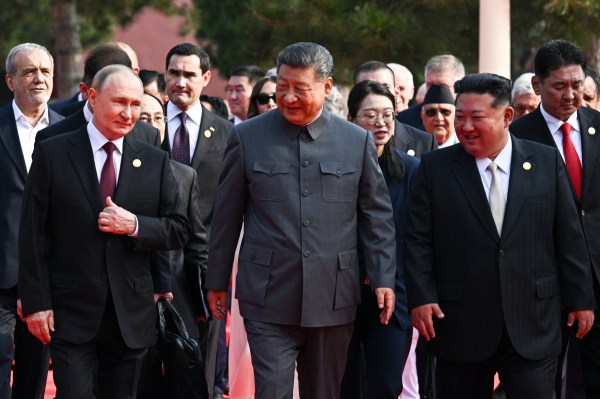The “respectable” case for populist governance goes like this.
Yes, we’ll probably have to put up with more demagoguery than we’re used to from our political leaders, regrettably. But we’ll be rewarded for our tolerance with economic policies that prioritize the interests of the working and middle classes to a greater degree than Americans are used to.
A government that’s truly by and for the people will be more prone to reflect popular prejudices and more willing to make struggling American households financially great again.
We’ve got to take the bitter with the sweet.
And who knows? If the populist economic project succeeds, some of that demagogic bitterness might drain away in time. The more optimistic the average American feels about his or her financial future, the less interest they’ll take in finding scapegoats for their problems. The sweet will eventually overwhelm the bitter.
In theory, the two halves of the Republican ticket this year reflect the bitter and sweet sides of populism. At the top we have the strutting demagogue, ever eager to identify some new species of cultural vermin that needs eradicating. At the bottom we have the whiz kid, blessed with brains and educated about the problems of deindustrialized America by hard experience.
If we want to get to a sweeter populist future led by highbrow intellectual J.D. Vance, we’ve got to take the bitter populist present led by lowbrow strongman Donald Trump.
When Trump chose Vance as his running mate, it was easy to imagine how that bitter/sweet dynamic might play out on the trail. The man at the top would continue to practice the dark arts, offering new enemies to his base to keep them motivated to vote, while the man at the bottom would tantalize better-educated voters by making a thoughtful case for a populist economic program.
J.D. could be the “suburbs-whisperer.” Anyone who feared that Trump 2.0 would be a mad ride into authoritarian chaos could listen to Vance’s soft-spoken policy pitch and feel reassured that there’d be some sweetness amid all the bitterness.
That’s how it could have gone. As it is, we find ourselves in mid-September with a bizarre inversion. Trump more so than Vance has taken the lead on economics, and has leaned into some ideas that seem lab-designed to benefit the upper class or to harm the lower classes that populism is supposed to protect.
And Vance more so than Trump has taken the lead on demagoguery lately, spearheading the agitation against Haitian immigrants in Springfield, Ohio, and behaving so recklessly in how he’s gone about it that he’s arguably outdone his running mate.
There isn’t much sweetness on either end of the Republican ticket. And given Vance’s trajectory, the populist future looks to be more bitter than its respectable champions had hoped.
Economic incoherence.
Trump doesn’t have a populist economic agenda. What he has are a few policy bribes aimed at discrete working-class swing constituencies, with no rhyme or reason to those proposals beyond the anxiety he feels about losing votes to Kamala Harris.
“NO TAX ON TIPS, NO TAX ON OVERTIME PAY, NO TAX ON SOCIAL SECURITY BENEFITS FOR SENIORS. KAMALA WILL GIVE NONE OF THIS,” he promised on Tuesday. He wants to exempt tips from taxation because he’s desperate to win Nevada, where hospitality workers are ubiquitous. He wants to exempt overtime pay because he fears that Harris’ union endorsements will weaken his blue-collar support. And he wants to exempt Social Security income because Harris has a leg up in bribing senior citizens and he’s anxious to match her somehow.
If enacted, his policies would massively distort how wages are paid, choke off billions in federal tax revenue, and possibly reignite inflation, but he’s not offering them as considered policy any more than Joe Biden was when he proposed forgiving student debt en masse. Biden’s plan was a bribe. Trump’s proposals are bribes. They’re money-for-votes transactions, not elements of some thoughtful program to uplift the working man.
I suppose that enough bribes aimed at enough working-class blocs might amount to a populist “agenda,” but that’s the thing. Not all of Trump’s proposals are aimed at helping the average joe. To the contrary.
His splashiest new proposal on Tuesday was made to voters in New York, which (in a quadrennial tradition) he seems to believe is in play this year. “I will turn it around, get SALT back, lower your Taxes, and so much more,” he vowed. “Get SALT back” seems to be Trump-ese for repealing the $10,000 cap on deducting state and local taxes (SALT) from federal income tax—never mind that it was his 2017 tax-cut law that imposed that cap in the first place.
The SALT cap is meaningless to most Americans, either because they don’t earn enough to owe more than $10,000 in local taxes or because they live in states with low rates of taxation. Lifting it shouldn’t be a priority for any populist who’s serious about putting the interests of the working class first. If anything, the opposite is true: Capping how much rich coastal elites can deduct from their federal taxes means more tax revenue that can be applied toward programs to help blue-collar Americans. And denying an outsized deduction to upper-class people who choose to live in high-tax blue states means less of a burden for working joes in low-tax red states to shoulder in trying to pay Uncle Sam’s bills.
It’s incoherent for a populist like Trump to want to lift the cap. His reason for doing so is no grander than that he thinks it’ll help squeeze a few extra votes out of wealthy New York professionals for him and for the vulnerable local Republicans whose seats might decide the next House majority. It’s another bribe—but to the rich. And not for the first time in this campaign.
That might be excusable as the sort of niche pander to which all politicians occasionally stoop if he were otherwise reliably putting the interests of the working class first. But consider how he answered a question about inflation on Tuesday.
He was asked at a town hall how he plans to bring down grocery prices, a predictable topic for a candidate in 2024. Yet his answer was impenetrable (as usual) and somehow boiled down to tariffs (also as usual). “Our farmers are being absolutely decimated right now. And, you know, one of the reasons is we allow a lot of farm product into our country,” Trump said. “We’re gonna have to be a little like other countries, we’re not gonna allow so much … we’re gonna let our farmers go to work.”
He’s going to reduce the supply of foreign produce in American supermarkets, in other words, in hopes that American farmers will eventually pick up the slack. You tell me: What happens to prices when the supply of something drops while demand for it remains constant?
And which part of American society will be harmed more by that: the working class that Trump allegedly champions or the wealthy who don’t need to worry what groceries cost?
Regressive tariffs on produce isn’t an idea you propose when you’re thinking seriously about how to help “the forgotten man.” It’s an idea you propose when you’re not thinking about economics at all and have settled on tariffs “as an elixir to solve every economic problem,” in Jonathan Chait’s words.
In fact, Trump’s economic program is less populist than what we might call popular-ist in the sense that it’s concerned entirely with boosting his chances of reelection, with zero regard for whether it’s feasible or which class will benefit from it or what sort of trade-offs it might entail. There’s nothing new about a Republican leader gorging on tax cuts without offsetting cuts to spending, unfortunately, but at least Reaganites had theories about how that might make fiscal sense in the long run. There’s not even a pretense of caring about that in Trump’s agenda.
Insofar as there’s a policy vision driving him, it’s to turn America into as much of an autarky as he can in four years, a sort of Trump Juche plan. But I think his motives are simpler: He wants to do the stuff that will make people more likely to vote for him, like slashing taxes and protecting entitlements and lowering interest rates and slapping “America First” tariffs on everything, with total disregard for the economic implications. He’s prepared to saddle the children of the working class with a federal debt so massive that the interest on it alone will soon make the social safety net on which they rely unsustainable.
All of which is maybe just a long way of saying that he doesn’t care about (most) policy, only about his own empowerment. He’s running for president because he wants to stay out of prison and punish his enemies, not because he’s burning to play Santa with the child tax credit or stop insurers from stiffing middle-class Americans with preexisting conditions. Trump’s in it for Trump, always.
Vance, on the other hand, is different. He’s the substantive populist. Isn’t he?
The making of a demagogue.
Both Republicans on the ticket this year are populists but only one is an ideologue. That’s why we’d expect Vance to do the heavy lifting on policy and Trump to stick to vilifying minorities.
Each man should play to his strengths, no?
So it’s strange to watch the moral panic over immigrant pet-eating in Ohio gain and sustain altitude due mainly to Vance’s efforts, not Trump’s. Trump did place it front and center in the campaign by mentioning it during his debate with Harris but J.D. was tweeting about it before then. And J.D.’s the one who’s gone on tweeting and doing interviews about it since the debate.
He’s really come into his own as the sort of gutter-dweller whom Trump’s MAGA base might take a shine to in 2028.
On Wednesday the Wall Street Journal published a new story about Springfield, Ohio, and the demagoguery to which it’s been subjected. According to the paper, Vance and his aides knew almost from the start that there was nothing to the allegations about pet-eating by Haitian immigrants—yet proceeded to flog the story anyway. On September 9, the day before the debate, one of the senator’s staffers called the Springfield city manager to check if the rumors were true and was told no, there was no evidence to support any of it.
By then it was too late, though. Vance had already posted about it on social media.
Fact-checking a sensational, racially incendiary claim is typically something a politician would do before deciding whether to make it but I suspect J.D. has learned from his running mate that some accusations are too politically useful to let truth get in the way. In fact, I’d guess that the staffer who called Springfield did so not because he wanted the straight dope but because he hoped the city manager would provide him with some sort of pseudo-factual peg on which to retroactively hang the smear campaign that had begun.
Either way, Vance didn’t retreat afterward. He defended the pet-eating propaganda as (essentially) fake but accurate while his staff went about quietly trying to convince the press that he’d been right all along. Which led to this immortal passage in Wednesday’s Journal story:
A Vance spokesperson on Tuesday provided The Wall Street Journal with a police report in which a resident had claimed her pet might have been taken by Haitian neighbors. But when a reporter went to Anna Kilgore’s house Tuesday evening, she said her cat Miss Sassy, which went missing in late August, had actually returned a few days later—found safe in her own basement.
Kilgore, wearing a Trump shirt and hat, said she apologized to her Haitian neighbors with the help of her daughter and a mobile-phone translation app.
That was decent of her but forthright apologies aren’t an option for a politician hoping to lead the movement to which she belongs. As things stand, some Haitian immigrants in Springfield are keeping their children home out of fear of harassment, with one local Haitian man who was interviewed by ABC News lamenting that he doesn’t see many of his countrymen on the streets anymore. A driver passing by allegedly yelled “Trump!” at him shortly before he spoke with the network.
Like his boss with respect to economic policy, Vance doesn’t seem to lose sleep over the long-term consequences of his politics.
Even apart from the Haitian hysteria, he’s thrown some hard punches lately that seem designed to please MAGA voters who are already locked in for Trump while potentially alienating some of those suburban professionals he should be whispering to. Last week he reconfirmed that he would have stopped the count on January 6 had he been in Mike Pence’s shoes, then mused that “if Donald Trump wanted to start a nuclear war with Russia, Mike Pence would be at the front of the line endorsing him right now.” On Tuesday, in an exchange with pundit David Frum, he accused center-right Trump critics of being on the same “team” as Trump’s two would-be assassins.
There’s no electoral logic to any of that. At best, Vance’s comments will be ignored; at worst, right-leaning voters who are leery of his running mate will have new reasons not to vote GOP this year. Doubling down on the coup and treating Mike Pence as if he’s Gen. Jack D. Ripper isn’t what you do if you’re executing a strategy to win the election. It’s what you do if you’re jonesing on your newfound stature as a prominent demagogue or if you’re already looking ahead to the next presidential cycle and keen to position yourself as the populist’s populist.
Whichever is true (probably both), it seems meaningful that the intellectual on the ticket has developed a taste for cutthroat demagoguery instead of cultivating a taste among voters for working-class economic policies.
Maybe that’s a strategic choice. Possibly Vance would prefer to talk economics but has concluded that what modern Americans really crave is hair-raising insinuations about their cultural enemies. I won’t dispute that: Among Never Trumpers (of which Vance was once famously one), there’s always been a suspicion that it’s not Trump’s immigration policies or his protectionism or even his celebrity that explains his mystique. It’s the pro-wrestling pageantry of how he operates. An unserious people wants to watch its political hero pummel the bad guys, not wonk out over how tax policy might marginally improve their quality of life. In huffing about the Haitian menace, J.D. is simply casting his line where the fish are biting.
I think that’s too charitable, though. He’s probably leaned into demagoguery for the same reason most other demagogues do: He enjoys it. It makes him feel powerful.
It must be a trip for a poor kid from a broken home to wake up one day and find the governor of his home state pleading with him for mercy. It must be wild to watch his claims about immigrants spreading disease be accepted uncritically by millions despite the fact that they’re untrue. I’m skeptical that Vance has legs as a MAGA leader into the future—some of his hobby horses aren’t theirs, and he’s probably already too disliked to be viable nationally—but you can see a twinkle in his eye when he talks about foreign infiltrators poisoning American communities.
A man given to saying things like “I think our people hate the right people” has more Trump in him than he’s been given credit for. We shouldn’t underestimate him.
Maybe Vance really is the future of populism, “respectable” or otherwise. He seems to understand what classical liberals—and Trump—have always intuited, that demagoguery isn’t a vehicle for a more progressive economic agenda but vice versa. You don’t take the bitter to get the sweet. You take the sweet in hopes that it’ll win you enough votes to get the bitter.







Please note that we at The Dispatch hold ourselves, our work, and our commenters to a higher standard than other places on the internet. We welcome comments that foster genuine debate or discussion—including comments critical of us or our work—but responses that include ad hominem attacks on fellow Dispatch members or are intended to stoke fear and anger may be moderated.
With your membership, you only have the ability to comment on The Morning Dispatch articles. Consider upgrading to join the conversation everywhere.